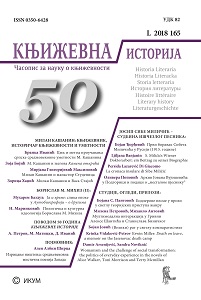(Велики) рат у светлу компаратистике
(The Great) War as a Comparative Notion
Author(s): Bojan JovićSubject(s): Serbian Literature
Published by: Институт за књижевност и уметност
Keywords: First World War;comparative literature;poetics;aesthetics;avant-garde;
Summary/Abstract: This paper discusses the possibility of studying the complex phenomenon of the First World War from the perspective of the contemporary comparative (general) literature. The beginning of the research introduces an interdisciplinary approach to the large-scale, active and diverse participation of intellectuals, writers and artists in the first global conflict in human history, which had a profound impact on the European culture and creativity in the aesthetic-poetic, conceptual and ideological, and socio-political domain. A comparison of attitudes towards the war is given, in general thoughts and in the works of writers and artists at the beginning of the 20th century (Italian and Russian Futurists, German Expressionists), as well as at the outbreak of the actual conflict, with reactions ranging from an enthusiastic acceptance to a mere fulfilling of the civic duty to an open opposition, emigration or actual desertion. A two-way impact of the immediate war experience in the artistic practice is presented – on the one hand, at the poetic-aesthetic level, through the presentation of death, destruction and suffering, with parallels drawn between the reality of war and the artistic world shaped in the foundations of the European literature (Homer) or contemporary aesthetics (Futurism, Expressionism, Cubism), and on the other hand, some practical applications of the avant-garde aesthetics in warfare («cubist»-like camouflage patterns). Particular emphasis is placed on the contextual and formal features of the aesthetic and poetic treatment of the war, functionally associated with the state of the system of literature (genres and forms) and the expressive possibilities of the context (time, environment) including the diachronic analysis. The end of the paper stresses the impact of the Great War on the dynamics of artistic movements and the creation of conditions for a number of different artistic phenomena, during and after the end of hostilities: the anti-war response with a clear rejection of the assumptions of the bourgeois civilization, including logic and reason (Dadaism); after the changes in borders, the disappearance of old and the emergence of new states and the displacement of a large number of people, the emergence of strong centres of groups of international artists (Paris, «Russian Berlin»), or generational connectivity and public appearance of artists (the first generation of Serbian avant-garde).
Journal: Књижевна историја
- Issue Year: 50/2018
- Issue No: 165
- Page Range: 223-237
- Page Count: 15
- Language: Serbian

